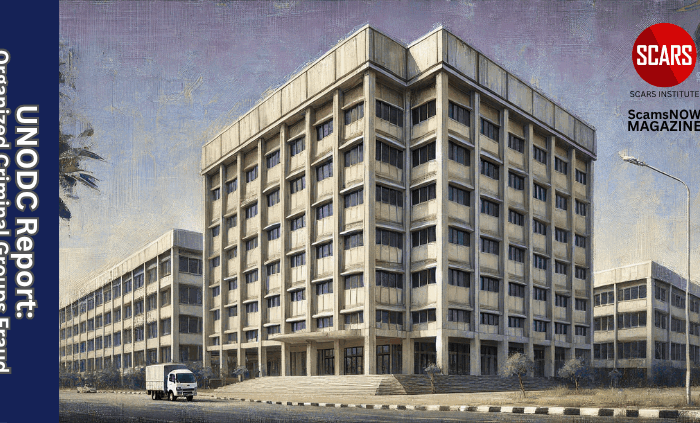The 2024 Global Fraud Summit In The UK
Addressing Global Fraud & Cybercrimes
Authors:
• SCARS Editorial Team – Society of Citizens Against Relationship Scams Inc.
• UK Home Office
About This Article
The historic Global Fraud Summit, held in the UK on March 10-11, 2024, brought together world leaders, industry experts, and representatives from multiple continents to tackle the growing threat of global fraud.
The summit aimed to foster international collaboration, raise public awareness, and develop strategies to disrupt criminal operations and prevent future scams.
A key outcome was the establishment of a joint communique outlining areas of focus, including information sharing, law enforcement cooperation, public education campaigns, and technological solutions.
This summit signifies a major step towards a more unified global front against fraud.

The Global Fraud Summit Delivers A Worldwide Commitment to Fight Cybercrime
The Global Fraud Summit, held in the UK on March 10 and 11, 2024, was the first-ever international gathering focused on tackling fraud as a global threat.
Here’s a summary of the key points:
Participants:
The Global Fraud Summit was hosted by the UK, with representation from Australia, Canada, France, Germany, Italy, Japan, New Zealand, South Korea, Singapore, and the US, alongside INTERPOL, the Financial Action Task Force (FATF), and the EU.
- World leaders from G7 and Five Eyes nations (US, UK, Canada, Australia, New Zealand)
- Senior ministers
- Representatives from Singapore and South Korea
- Industry leaders from banks, tech companies, and other sectors
Goals:
- International Collaboration: Building partnerships and information sharing to combat cross-border fraud schemes.
- Public awareness: Educating citizens on how to recognize and avoid fraud, especially vulnerable populations.
- Targeting Organized Crime: Disrupting the operations of transnational criminal groups involved in large-scale fraud.
- Preventing Fraud: Exploring ways to make it more difficult for fraudsters to operate, such as through technological solutions and industry regulations.
Outcomes:
- A joint communique outlining the importance of international cooperation and specific areas of focus for tackling fraud (https://homeofficemedia.blog.gov.uk/2024/02/12/fraud-factsheet/).
- Increased awareness of the global scale and impact of fraud.
- Commitment from participating governments and industries to work together on solutions.
Based on the information from the Home Office blog post you linked about the summit (https://homeofficemedia.blog.gov.uk/2024/02/12/fraud-factsheet/), we can expect the communique to highlight the following key areas of focus for international cooperation against fraud:
- Information Sharing: Establishing secure channels for sharing intelligence on cross-border fraud schemes, including sharing data on modus operandi, emerging trends, and identified fraudsters.
- Law Enforcement Cooperation: Enhancing collaboration between law enforcement agencies from different countries to track down perpetrators, dismantle criminal networks, and recover stolen funds. This might involve joint investigations, extradition treaties, and capacity building for law enforcement in countries more vulnerable to fraud.
- Regulatory Harmonization: Exploring ways to standardize regulations across different countries regarding areas like financial services, data protection, and online commerce. This would make it harder for fraudsters to exploit loopholes in different jurisdictions.
- Public Awareness Campaigns: Developing and implementing coordinated public awareness campaigns to educate citizens on how to identify and avoid fraud. This might involve targeting specific demographics like the elderly or those new to online banking.
- Technological Solutions: Encouraging collaboration between governments, tech companies, and financial institutions to develop and implement technological solutions that make it more difficult for fraudsters to operate. This could involve advancements in identity verification, fraud detection algorithms, and secure payment systems.
- Public-Private Partnerships: Highlighting the importance of partnerships between governments, law enforcement agencies, financial institutions, and technology companies to share information, resources, and expertise in tackling fraud.
These are some of the potential areas outlined in the communique. As more information becomes publicly available, we may learn about more specific commitments and action plans made by the participating nations and industries.
Global Fraud Summit Communiqué: 11 March 2024 – Policy paper
Opening
1. We, ministers and representatives of Australia, Canada, France, Germany, Italy, Japan, New Zealand, the Republic of Korea, Singapore, the United Kingdom, and the United States convened in person in Lancaster House, London, for the inaugural Global Fraud Summit. We discussed the increasing threat of fraud against individuals and business and the challenges it poses. We stand firm in our commitment to tackle fraud and crack down on the criminal networks responsible. In this we were supported by INTERPOL, the Financial Action Task Force and the UN Office on Drugs and Crime. The European Union was also represented at the meeting.
2. Fraud against individuals and businesses, has grown rapidly to become one of the most prevalent crimes globally and is an organised transnational threat. In some countries, it is the most common crime type that citizens experience. Fraudsters operate at scale, exploiting telecommunications networks, cyberspace and a population that spends an increasing amount of time online.
3. Fraud types can vary across jurisdictions, but the devastating impact of fraud is universal. Fraud causes significant financial losses for individuals and institutions. It damages trust between consumers and legitimate businesses. It also causes deep distress for victims. Finally, failure to tackle fraud risks undermining public trust in law enforcement and government institutions.
4. With fraudsters adopting ever more sophisticated methods, it is the shared responsibility of governments, law enforcement, industry, regulators, and individuals to combat this rising threat.
5. We therefore endorse the following four-part framework for tackling fraud. We also commit to co-ordinating and leading the international response to ensure that the criminals responsible have nowhere to hide.
01: Build international understanding, partnerships and capabilities
6. We recognise that fraud is a truly transnational issue and that more must be done in each country, and across the world, to mitigate the significant harm to victims. In this regard, we commit to building on the G7 Interior Ministers’ Declaration on Enhancing Cooperation in the Fight against Transnational Organized Fraud issued on 10 December 2023 in Mito, Japan.
01.A: Develop our understanding of the fraud threat
7. Developing and maintaining a detailed knowledge of the constantly changing threat is key to effectively tackling fraud. We will strengthen our individual understanding of the types, volumes and origins of fraud taking place in our jurisdictions.
8. As fraudsters evolve their tactics, we must continue to strengthen our collective understanding of the threat to allow us to focus our efforts where they will have the greatest impact. We recognise Europol’s ongoing monitoring and reporting and will engage with UK funded INTERPOL global fraud threat assessments.
01.B: Strengthen multilateral partnerships and grow capabilities
9. Beyond this Global Fraud Summit, we recognise that a range of multilateral bodies including the G7, G20, Five Country Ministerial (FCM), European Union, Association of South East Asian Nations (ASEAN), United Nations Office on Drugs and Crime (UNODC), Organisation for Economic Cooperation and Development (OECD), Financial Action Task Force (FATF), INTERPOL and others, will play a key role in driving forward global action to combat fraud. These diverse organisations reflect the range of initiatives required to deliver a global response to fraud, spanning political action, law enforcement, capacity building, industry activity, and regulation.
10. We commit to using our membership of these bodies and other opportunities for global leadership to ensure recognition of fraud as an international priority both within and beyond the jurisdictions represented at this Summit. We will continue to discuss fraud at all appropriate forums including the FCM and G7 to drive a truly global response to the fraud threat.
11. We will maintain momentum on this important matter and support the next Global Fraud Summit.
02: Better empowering the public
12. Victims of fraud often feel significant shame and stigma. We must ensure that protecting the public is a central component of any response. We will improve public awareness of the threat and equip all citizens, especially the most vulnerable, with the relevant tools to recognise, reject and report fraudsters’ tactics.
02.A: Strengthen victim support
13. We commit to raising public awareness of fraud to prevent victimisation and encourage greater reporting. In particular, we must reduce the repeat victimisation of those who are the most vulnerable. To support this, we will share best practice on victim support practices and will align public messaging through existing multilateral bodies and bilateral engagement.
14. It is vital that consumers can trust the origin of the communications, such as calls and texts, that they receive. We commit to share best practice and align, where appropriate, measures designed to prevent criminals impersonating individuals and legitimate businesses through telecommunications networks and through the internet.
15. We recognise the psychological and emotional harms of fraud and will work with civil society organisations and the non-governmental sector both domestically and internationally to provide vital support to victims.
02.B: Support victims to reclaim their money
16. Given the speed with which proceeds of crime are often transferred and laundered across jurisdictions, timely international cooperation is critical. We must retrieve the proceeds of fraud from criminals and wherever possible return them to victims.
17. We welcome the recent significant enhancement of the FATF standards on asset recovery and support the global implementation of the conclusions of the FATF, INTERPOL, and Egmont group report ‘Illicit Financial Flows from Cyber-Enabled Fraud’. We will seek to strengthen and improve awareness of broader existing mechanisms for international asset recovery.
18. We recognise that we must go further to support victims. We will continue to work through existing international fora to explore ways to improve the repatriation of fraudulently acquired funds from bank accounts across jurisdictions.
03: Pursue organised fraudsters acting transnationally
19. Law enforcement agencies across the globe undertake significant work to identify and tackle fraud. Fraudsters operate globally and international collaboration is critical to dismantle these organised networks. We will seek to build on existing initiatives and collaboration to improve the global law enforcement response.
03.A: Increase data and intelligence sharing
20. Governments and law enforcement must keep pace with the rapidly changing threat picture. To this end, we commit to the appropriate sharing of data and intelligence with INTERPOL, Europol and amongst all attendees to ensure timely intelligence sharing which will support further operational action. We will work together to support INTERPOL intelligence sharing. We will also support the increased use of core INTERPOL capabilities including, but not limited to, INTERPOL notices, services such as I-GRIP, and their ability to facilitate data and information sharing.
03.B: Strengthen enforcement activity in mutual threat areas
21. We recognise that we are collectively being targeted by criminal networks operating from specific jurisdictions. We support stronger coordination of law enforcement operations in these jurisdictions and will continue to explore further avenues to bolster collaboration, including via sanctions or other mechanisms, as may be appropriate.
03.C: Increase capability and capacity building initiatives
22. We recognise that the global impact of fraud will be disproportionate, and that fraud will hinder economic development for many. We must ensure there is sufficient support for all countries to put in place measures to combat fraud. To this end, we commit to working together to explore opportunities to share international best practice and to deliver a wide range of capability and capacity building initiatives.
04: Preventing the reach and means of fraudsters
23. Strong industry engagement is key to preventing fraud. As our societies become more digitally centred, new technologies both improve the lives of the public and expand the modus operandi of fraudsters.
24. Technology companies (including social media, e-commerce and online messaging platforms and online advertising services), telecommunications providers and financial institutions (including traditional banks and digital financial institutions) all form part of the ecosystem that fraudsters exploit to send credible messages impersonating legitimate individuals and institutions and defraud victims.
25. We recognise that the scale and nature of the fraud threat on these platforms are vast. Industry play a critical role in the response required and we expect them to take further action to strengthen their counter-fraud efforts. There must be greater collaboration both within and across sectors.
04.A: Strengthen government and industry engagement
26. We commit to building cooperation with industry domestically and international. We will share learning, information, and resource across government, law enforcement, industry and regulators to prevent criminals exploiting these services and platforms for their own gain.
27. We expect industry to maintain a strong evidence base on the scale of fraud and the methodologies used by criminals, in order to better prevent fraud.
28. We encourage industry to increase efforts to identify and remove fraudulent materials on their public platforms.
04.B: Global consideration of industry agreements
29. Fraud is an increasingly digital crime with the threat continually evolving, including with the use of artificial intelligence. Countries may take account of best practice in their approach to working with industry to combat fraud.
Looking Ahead:
The summit is a significant step towards a more coordinated global response to fraud. The specific actions and initiatives implemented by participating nations and industries will determine the long-term success of this effort.
Please Rate This Article
Please Leave Us Your Comment
Also, tell us of any topics we might have missed.
Thank you for your comment. You may receive an email to follow up. We never share your data with marketers.
-/ 30 /-
What do you think about this?
Please share your thoughts in a comment above!
More Government Policy Related Information:
- UK hosts world leaders for first Global Fraud Summit – GOV.UK (www.gov.uk)
- Global Fraud Summit Communiqué: 11 March 2024 – GOV.UK (www.gov.uk)
- UK Money Mules New Plan Of Action To Disrupt Organized Crime – 2024 (scamsnow.com)
- EUROPOL Action Against European Money Laundering Operations – 2024 (scamsnow.com)
- INTERPOL Warns Of ‘Metacrime’ On The Metaverse – 2024 (scamsnow.com)
- NASDAQ Global Financial Crime Report: Criminals Took US$3.1 Trillion from Victims and the Economy in 2023 (scamsnow.com)
- UNODC Report on Casinos and Cryptocurrency Scams and Money Laundering 2024 (scamsnow.com)
- CDA Section 230 – Groundbreaking Decision in California Civil Case – 2024 (scamsnow.com)
- Irish Criminal Assets Bureau – Deny And Deprive Criminals Of Assets Acquired Through Criminal Conduct – 2023 (scamsnow.com)
-/ 30 /-
What do you think about this?
Please share your thoughts in a comment above!
SCARS LINKS: AgainstScams.org RomanceScamsNOW.com ContraEstafas.org ScammerPhotos.com Anyscam.com ScamsNOW.com
reporting.AgainstScams.org support.AgainstScams.org membership.AgainstScams.org donate.AgainstScams.org shop.AgainstScams.org
youtube.AgainstScams.org linkedin.AgainstScams.org facebook.AgainstScams.org
ARTICLE RATING
TABLE OF CONTENTS
CATEGORIES
MOST POPULAR COMMENTED ARTICLES
POPULAR ARTICLES
U.S. & Canada Suicide Lifeline 988
![NavyLogo@4x-81[1]](https://scamsnow.com/wp-content/uploads/2025/04/NavyLogo@4x-811.png)
ARTICLE META
WHAT PEOPLE ARE TALKING ABOUT LATEST SITE COMMENTS
See Comments for this Article at the Bottom of the Page
on Aren’t We All The Same? Aren’t We All Just Meat-Robots? An essay on Humanity by Tim McGuinness, Ph.D. – 2025: “excelente!!! la claridad y la profundidad del análisis son realmente impresionantes. Me aportó mucho leerlo. totalmente de acuerdo entre la…” Jul 16, 11:17
on Savior Syndrome And The Negative Consequences To Them And Other Scam Victims – 2023: “We must heal ourselves before trying to help or heal others. It is easy to get caught up in the…” Jul 16, 11:13
on Anger & Self-Radicalization – Recovery Psychology 2023: “Anger can be useful but most often it is destructive on the individual, their family and friends. I like that…” Jul 16, 10:59
on Residual Fear In Scam Victims – 2024 [UPDATED 2025]: “Thank you for another fantastic SCARS article! I have felt some fear lately, that has caused me to feel tense…” Jul 16, 10:10
on Living in the Invisible Safety Bubble – 2025: “Enlightening, thought provoking, and another SCARS article that gives me pause. Recovery is a process and takes time. In a…” Jul 16, 07:46
on Living in the Invisible Safety Bubble – 2025: “We have too many kinds of scams in Japan. Recently, there are impersonation scam of “fake Cardinal account” gathering fraud…” Jul 16, 07:27
on Motte and Bailey – A Cognitive Pattern & Defense Mechanism that Inhibits Honest Acceptance – 2025: “Important information for reflection for any survivor : -to what extent the Motte & Bailey method is present / still…” Jul 16, 07:21
on Arts and Crafts Can Significantly Aid in Recovery for Scam Victims – 2025: “Right after the scam, I didn’t want to do anything. I felt defeated and ashamed—as if I had betrayed both…” Jul 16, 00:01
on The Fallacy of Fallacies & Living in the Real World – Error in Reasoning that Makes an Opinion Seem Valid – 2025: “I didn’t know about fallacies and cognitive biases until I enrolled in the Survivor’s School. When I learned about them,…” Jul 15, 23:40
on Motivational Denial – Recovery Psychology – 2023: “I agree with this article about some motivational material Looking at motivational material is not a totally bad thing but…” Jul 15, 12:25
on Living in the Invisible Safety Bubble – 2025: “I thought this was a brilliant article….lots to think about now.” Jul 15, 09:39
on Arts and Crafts Can Significantly Aid in Recovery for Scam Victims – 2025: “I did not realize that things I like doing very much—knitting or sudoku—were so helpful in my recovery process. The…” Jul 14, 11:28
on Projection And Scam Victims: “The moment I realized I had a financial loss due to a scam I realized that I felt shame, guilt,…” Jul 13, 19:12
on Japanese Legend of Tears – When There Are No Words – 2025: “After discovering the fraud, the pain was enormous. I shed oceans of tears, but I always tried to do it…” Jul 13, 10:50
on The SCARS Institute Scam Victim Recovery Timeline – 2025: “Wow. I umm experienced some of the later curves. I have been bouncing back and forth between asking myself why…” Jul 11, 00:01
on Transference And Emotional Danger After The Scam – 2024: “Thank you for the kind but firm reminder that the person in the stolen profile photo has their own life.…” Jul 9, 01:26
on ‘Mental Defeat’ – The Unique Condition Of Giving Up – 2024: “Thank you for another great article. I can see from this article that mental defeat would be debilitating to a…” Jul 9, 00:49
on Trust: Romance Scams Betrayal And Scam Victims – 2024: “This provided valuable insight that I can identify with” Jul 8, 16:44
on A Scam Victim in Extreme Distress – Stopping the Pain – 2024: “Your trust issues are very understandable. We are very sorry this happened to you. We suggest that you contact an…” Jul 8, 14:42
on A Scam Victim in Extreme Distress – Stopping the Pain – 2024: “My online counselors advised me to check myself in. I went to the hospital because I was suicidal. After I…” Jul 8, 13:44
Important Information for New Scam Victims
Please visit www.ScamVictimsSupport.org – a SCARS Website for New Scam Victims & Sextortion Victims
SCARS Institute now offers a free recovery program at www.SCARSeducation.org
Please visit www.ScamPsychology.org – to more fully understand the psychological concepts involved in scams and scam victim recovery
If you are looking for local trauma counselors, please visit counseling.AgainstScams.org
If you need to speak with someone now, you can dial 988 or find phone numbers for crisis hotlines all around the world here: www.opencounseling.com/suicide-hotlines
Statement About Victim Blaming
Some of our articles discuss various aspects of victims. This is both about better understanding victims (the science of victimology) and their behaviors and psychology. This helps us to educate victims/survivors about why these crimes happened and not to blame themselves, better develop recovery programs, and help victims avoid scams in the future. At times, this may sound like blaming the victim, but it does not blame scam victims; we are simply explaining the hows and whys of the experience victims have.
These articles, about the Psychology of Scams or Victim Psychology – meaning that all humans have psychological or cognitive characteristics in common that can either be exploited or work against us – help us all to understand the unique challenges victims face before, during, and after scams, fraud, or cybercrimes. These sometimes talk about some of the vulnerabilities the scammers exploit. Victims rarely have control of them or are even aware of them, until something like a scam happens, and then they can learn how their mind works and how to overcome these mechanisms.
Articles like these help victims and others understand these processes and how to help prevent them from being exploited again or to help them recover more easily by understanding their post-scam behaviors. Learn more about the Psychology of Scams at www.ScamPsychology.org
SCARS INSTITUTE RESOURCES:
If You Have Been Victimized By A Scam Or Cybercrime
♦ If you are a victim of scams, go to www.ScamVictimsSupport.org for real knowledge and help
♦ Enroll in SCARS Scam Survivor’s School now at www.SCARSeducation.org
♦ To report criminals, visit https://reporting.AgainstScams.org – we will NEVER give your data to money recovery companies like some do!
♦ Follow us and find our podcasts, webinars, and helpful videos on YouTube: https://www.youtube.com/@RomancescamsNowcom
♦ Learn about the Psychology of Scams at www.ScamPsychology.org
♦ Dig deeper into the reality of scams, fraud, and cybercrime at www.ScamsNOW.com and www.RomanceScamsNOW.com
♦ Scam Survivor’s Stories: www.ScamSurvivorStories.org
♦ For Scam Victim Advocates visit www.ScamVictimsAdvocates.org
♦ See more scammer photos on www.ScammerPhotos.com
You can also find the SCARS Institute on Facebook, Instagram, X, LinkedIn, and TruthSocial
Psychology Disclaimer:
All articles about psychology and the human brain on this website are for information & education only
The information provided in this and other SCARS articles are intended for educational and self-help purposes only and should not be construed as a substitute for professional therapy or counseling.
Note about Mindfulness: Mindfulness practices have the potential to create psychological distress for some individuals. Please consult a mental health professional or experienced meditation instructor for guidance should you encounter difficulties.
While any self-help techniques outlined herein may be beneficial for scam victims seeking to recover from their experience and move towards recovery, it is important to consult with a qualified mental health professional before initiating any course of action. Each individual’s experience and needs are unique, and what works for one person may not be suitable for another.
Additionally, any approach may not be appropriate for individuals with certain pre-existing mental health conditions or trauma histories. It is advisable to seek guidance from a licensed therapist or counselor who can provide personalized support, guidance, and treatment tailored to your specific needs.
If you are experiencing significant distress or emotional difficulties related to a scam or other traumatic event, please consult your doctor or mental health provider for appropriate care and support.
Also read our SCARS Institute Statement about Professional Care for Scam Victims – click here
If you are in crisis, feeling desperate, or in despair, please call 988 or your local crisis hotline.
More ScamsNOW.com Articles
A Question of Trust
At the SCARS Institute, we invite you to do your own research on the topics we speak about and publish. Our team investigates the subject being discussed, especially when it comes to understanding the scam victims-survivors’ experience. You can do Google searches, but in many cases, you will have to wade through scientific papers and studies. However, remember that biases and perspectives matter and influence the outcome. Regardless, we encourage you to explore these topics as thoroughly as you can for your own awareness.














![scars-institute[1]](https://scamsnow.com/wp-content/uploads/2025/04/scars-institute1.png)
![niprc1.png1_-150×1501-1[1]](https://scamsnow.com/wp-content/uploads/2025/04/niprc1.png1_-150x1501-11.webp)

Leave a Reply